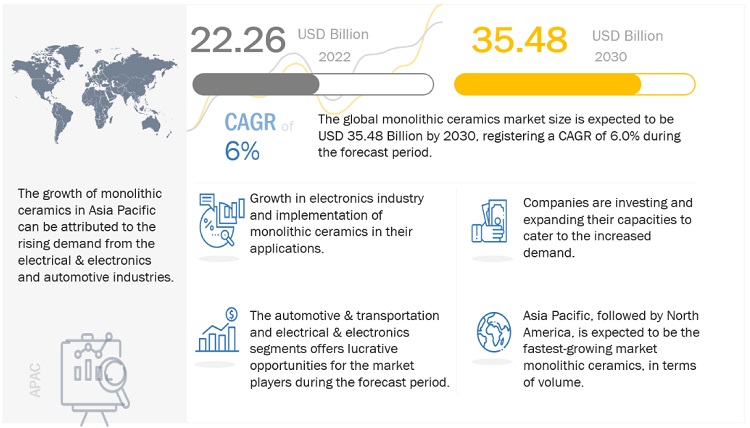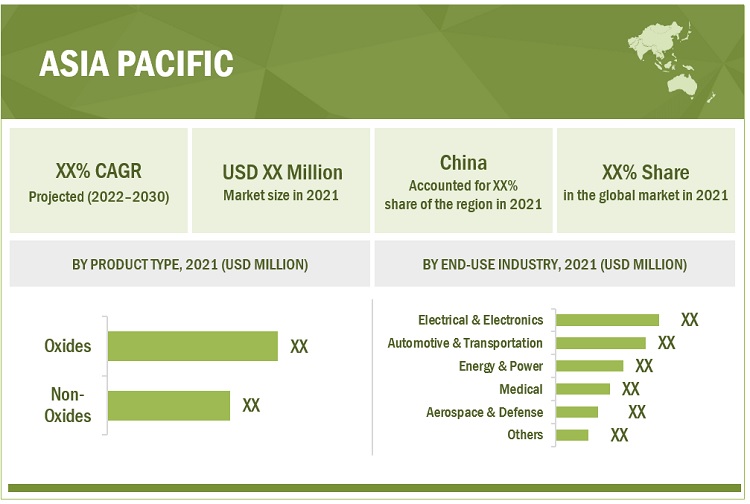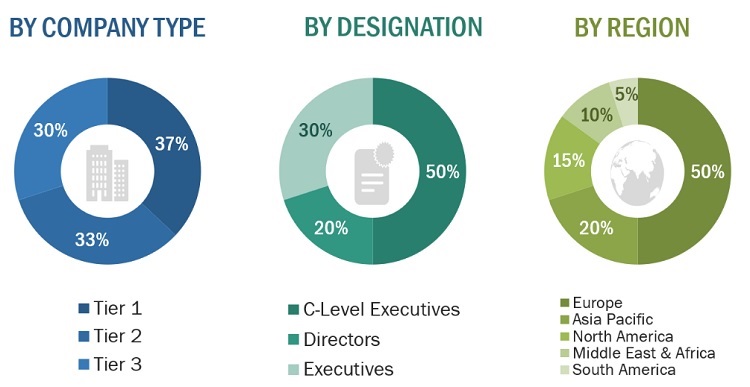Monolithic Ceramics Market by Product Type (Oxides, and Non-Oxides), End-Use Industry (Electrical & Electronics, Automotive & Transportation, Aerospace & Defense, Energy & Power, Medical, and Others), Region - Forecast to 2030
The monolithic ceramics market is projected to reach USD 35.48 billion by 2030, at a CAGR of 6.0% from USD 22.26 billion in 2022. One of the major factors contributing to the growth of the monolithic ceramics market is majorly influenced due to their properties such as reliability, durability, and resistance to high temperatures. The rising demand from electrical & electronics and automotive industry is also driving the market.
Attractive Opportunities in the Monolithic Ceramics Market

To know about the assumptions considered for the study, Request for Free Sample Report
Market Dynamics
Driver: Rising demand for electronic devices
The consumer electronics industry is increasingly adopting the usage of monolithic ceramics in their products. Monolithic ceramics are increasingly used in manufacturing capacitors and transistors for various electronic devices such as phones, laptops, TVs, IOT devices and others. With increasing shipment of electronic goods globally, the demand for monolithic ceramics is expected to be boosted.
Restraints: High cost and tedious production process affects the market growth
The monolithic ceramics irrespective of the applications, the production process is tedious resulting in increased production cost. This is a major set-back for the market as it will increase the cost of end-use products. Further, the increase in cost for R&D activities for implementation in industrial application will burden the market penetration of monolithic ceramics.
Opportunity: Increasing use in aerospace and defense industries
The low weight of the composite material is an important parameter for various industries such as aerospace and defense. This leads to increase in demand for lightweight armors and engine components. Many companies especially in Europe and US are putting efforts to build fuel-efficient aircraft. Therefore, the new aircraft engines are expected to rise the demand for more monolithic ceramics components. Defense equipment manufacturers have also started focusing on lightweight and high fracture toughness armors.
Challenge: Slower acceptance in new applications
There is slower acceptance of monolithic ceramics in new applications due to lack of customer awareness and confidence. In high-end applications for aerospace and defense components and armors, monolithic ceramics is preferred, but in low-cost applications like component manufacturing in the electronics industry the use of monolithic ceramics still seems to blur due to its high price.
“Oxide monolithic ceramics was the largest product type for monolithic ceramics market in 2021, in terms of value”
The oxide product type accounted for the largest share of the global monolithic ceramics market, in terms of value, in 2021. The demand for monolithic ceramics in the electronics & automotive applications is expected to increase mainly because of the rise in demand for high performance, light weighting across the industries globally.
“Asia Pacific was the largest market for monolithic ceramics in 2021, in terms of value.”
Asia Pacific is the largest monolithic ceramics market and is projected to register the highest CAGR, in terms of volume, between 2022 and 2030. Economic growth in the region has led to high internal trade and domestic transportation of commodities and supplies. China and Japan are some of the largest monolithic ceramics manufacturers globally. These countries are competing to manufacture technologically advanced monolithic ceramics and are investing heavily in their research and development to develop new products. Furthermore, the boom of the electronic goods market is further fueling the demand for monolithic ceramics. This has increased the consumption of ceramics in automotive and electronic goods industries, thus driving the global monolithic ceramics market.

To know about the assumptions considered for the study, download the pdf brochure
Key Market Players
The key players in this market are Ceramtec GmbH (Germany), Ceradyne, Inc. (US), Advanced Ceramics Manufacturing LLC (US), CoorsTek, Inc. (US), Pingxiang Yingchao Chemical Packing Co., Ltd. (China), KYOCERA Corporation (Japan), Saint-Gobain Ceramic Materials (France), Murata Manufacturing Co., Ltd (Japan), McDanel Advanced Ceramic Technologies (US), HC Starck GmbH (Germany). Continuous developments in the market—including new product launches, mergers & acquisitions, agreements, and expansions—are expected to help the market grow. Leading manufacturers of monolithic ceramics market have opted for new product launches to sustain their market position.
Scope of the Report
|
Report Metric |
Details |
|
Years considered for the study |
2018-2030 |
|
Base Year |
2021 |
|
Forecast period |
2022–2030 |
|
Units considered |
Volume (Kiloton); Value (USD Billion) |
|
Segments |
Product Type, End-Use Industry, and Region |
|
Regions |
Asia Pacific, North America, Europe, Middle East & Africa, and South America |
|
Companies |
The key players in this market are Ceramtec GmbH (Germany), Ceradyne, Inc. (US), Advanced Ceramics Manufacturing LLC (US), CoorsTek, Inc. (US), Pingxiang Yingchao Chemical Packing Co., Ltd. (China), KYOCERA Corporation (Japan), Saint-Gobain Ceramic Materials (France),Murata Manufacturing Co., Ltd (Japan), McDanel Advanced Ceramic Technologies (US), HC Starck GmbH (Germany). |
This report categorizes the global monolithic ceramics market based on product type, end-use industry, and region.
On the basis of product type, the Monolithic ceramics market has been segmented as follows:
- Oxides
- Non-Oxides
- Nitrides
- Carbides
- Borides
On the basis of end-use industry, the monolithic ceramics market has been segmented as follows:
- Electrical & Electronics
- Automotive & Transportation
- Aerospace & Defense
- Energy & Power
- Medical
- Others
On the basis of region, the monolithic ceramics market has been segmented as follows:
- Asia Pacific
- Europe
- North America
- Middle East & Africa
- South America
Frequently Asked Questions (FAQ):
What is the expected growth rate of monolithic ceramics market?
The forecast period for monolithic ceramics market in this study is 2022-2030. The monolithic ceramics market is projected to grow at CAGR of 6.0%, in terms of value, during the forecast period.
Who are the major key players in monolithic ceramics market?
Ceramtec GmbH (Germany), Ceradyne, Inc. (US), Advanced Ceramics Manufacturing LLC (US), CoorsTek, Inc. (US), Pingxiang Yingchao Chemical Packing Co., Ltd. (China), KYOCERA Corporation (Japan), Saint-Gobain Ceramic Materials (France), Murata Manufacturing Co., Ltd (Japan), McDanel Advanced Ceramic Technologies (US), HC Starck GmbH (Germany).
What is the average selling price trend for monolithic ceramics market?
Prices are low in Asian countries (primarily China and India) compared to those in Europe and North America due to the low prices of raw materials and the availability of low-cost workforces in Asia Pacific. .
To speak to our analyst for a discussion on the above findings, click Speak to Analyst

Table of Content
1 Introduction
1.1 Objectives of the Study
1.2 Market Definition
1.3 Market Scope
1.3.1 Markets Covered
1.3.2 Years Considered in the Report
1.4 Currency
1.5 Limitations
1.6 Stakeholders
2 Research Methodology
2.1 Market Share Estimation
2.1.1 Secondary Data
2.1.1.1 Key Data from Secondary Sources
2.1.2 Primary Data
2.1.2.1 Key Data from Primary Sources
2.1.2.2 Key Industry Insights
2.2 Market Size Estimation
2.2.1 Bottom-Up Approach
2.2.2 Top-Down Approach
2.3 Market Breakdown & Data Triangulation
2.4 Research Assumptions
3 Executive Summary
4 Premium Insights
4.1 Significant Opportunities in Monolithic Ceramics Market, 2022–2030
4.2 Monolithic Ceramics Market, By Product Type
4.4 Monolithic Ceramics Market, By End-Use Industry
4.5 Monolithic Ceramics Market, By Key Countries
5 Market Overview
5.1 Introduction
5.2 Market Dynamics
5.3.1 Drivers
5.3.2 Restraints
5.3.3 Opportunities
5.4.4 Challenges
5.3 Porter's Five Forces Analysis
5.4.1 Bargaining Power of Suppliers
5.4.2 Bargaining Power of Buyers
5.4.3 Threat of New Entrants
5.4.4 Threat of Substitutes
5.4.5 Degree of Competition
5.4 Supply Chain Analysis
5.5 Ecosystem: Monolithic Ceramics Market
5.6 Value Chain Analysis
5.7 Technology Analysis
5.8 Pricing Analysis
5.9 Trends and Disruptions Impacting Customers
6 Monolithic Ceramics Market, By Product Type
6.1 Non-Oxides
6.1.1 Nitrides
6.1.2 Carbides
6.1.3 Borides
6.2 Oxides
6.3 Others
7 Monolithic Ceramics Market, By End-Use Industry
7.1 Electrical & Electronics
7.2 Automotive & Transportation
7.3 Aerospace & Defense
7.4 Energy & Power
7.5 Medical
7.6 Others
8 Monolithic Ceramics Market, By Region
8.1 Introduction
8.2 North America
8.2.1 Monolithic Ceramics Market Size in North America, By Product Type
8.2.2 Monolithic Ceramics Market Size in North America, By End-Use Industry
8.2.3 Monolithic Ceramics Market Size in North America, By Country
8.2.3.1 Canada
8.2.3.1.1 Monolithic Ceramics Market Size in Canada, By End-Use Industry
8.2.3.2 U.S.
8.2.3.2.1 Monolithic Ceramics Market Size in U.S., By End-Use Industry
8.2.3.3 Mexico
8.2.3.3.1 Monolithic Ceramics Market Size in Mexico, By End-Use Industry
8.3 Europe
8.3.1 Monolithic Ceramics Market Size in Europe, By Product Type
8.3.2 Monolithic Ceramics Market Size in Europe, By End-Use Industry
8.3.3 Monolithic Ceramics Market Size in Europe, By Country
8.3.3.1 Germany
8.3.3.1.1 Monolithic Ceramics Market Size in Germany, By End-Use Industry
8.3.3.2 France
8.3.3.2.1 Monolithic Ceramics Market Size in France, By End-Use Industry
8.3.3.3 UK
8.3.3.3.1 Monolithic Ceramics Market Size in UK, By End-Use Industry
8.3.3.4 Italy
8.3.3.4.1 Monolithic Ceramics Market Size in Italy, By End-Use Industry
8.3.3.5 Rest of Europe
8.3.3.5.1 Monolithic Ceramics Market Size in Rest of Europe, By End-Use Industry
8.4 Asia Pacific
8.4.1 Monolithic Ceramics Market Size in Asia Pacific, By Product Type
8.4.2 Monolithic Ceramics Market Size in Asia Pacific, By End-Use Industry
8.4.3 Monolithic Ceramics Market Size in Asia Pacific, By Country
8.4.3.1 China
8.4.3.1.1 Monolithic Ceramics Market Size in China, By End-Use Industry
8.4.3.2 Japan
8.4.3.2.1 Monolithic Ceramics Market Size in Japan, By End-Use Industry
8.4.3.3 India
8.4.3.3.1 Monolithic Ceramics Market Size in India, By End-Use Industry
8.4.3.4 South Korea
8.4.3.4.1 Monolithic Ceramics Market Size in South Korea, By End-Use Industry
8.4.3.5 Rest of Asia Pacific
8.4.3.5.1 Monolithic Ceramics Market Size in Rest of Asia Pacific, By End-Use Industry
8.5 South America
8.5.1 Monolithic Ceramics Market Size in South America, By Product Type
8.5.2 Monolithic Ceramics Market Size in South America, By End-Use Industry
8.5.3 Monolithic Ceramics Market Size in South America, By Country
8.5.3.1 Brazil
8.5.3.1.1 Monolithic Ceramics Market Size in Brazil, By End-Use Industry
8.5.3.2 Argentina
8.5.3.2.1 Monolithic Ceramics Market Size in Argentina, By End-Use Industry
8.5.3.3 Rest of South America
8.5.3.3.1 Monolithic Ceramics Market Size in South America, By End-Use Industry
8.6 Middle East & Africa
8.6.1 Monolithic Ceramics Market Size in Middle East & Africa, By Product Type
8.6.2 Monolithic Ceramics Market Size in Middle East & Africa, By End-Use Industry
8.6.3 Monolithic Ceramics Market Size in Middle East & Africa, By Country
8.6.3.1 Saudi Arabia
8.6.3.1.1 Monolithic Ceramics Market Size in Saudi Arabia, By End-Use Industry
8.6.3.2 South Africa
8.6.3.2.1 Monolithic Ceramics Market Size in South Africa, By End-Use Industry
8.6.3.3 Rest of Middle East & Africa
8.6.3.3.1 Monolithic Ceramics Market Size in Rest of Middle East & Africa, By End-Use Industry
9 Competitive Landscape
9.1 Introduction
9.2 Market Share Analysis
9.3 Market Ranking
9.4 Market Evaluation Framework
9.4.1 Product Launches and Developments
9.4.2 Expansions
9.4.3 Contracts and Agreements
9.4.4 Mergers & Acquisitions
9.5 Revenue Analysis of Top Market Players
9.6 Company Evaluation Matrix
10.4.1 Star
10.4.2 Emerging Leaders
10.4.3 Pervasive
10.4.4 Participants
10 Company Profiles
* (Business Overview, Products Mix, Recent Developments, SWOT Analysis, MnM view)
10.1 Ceramtec GmbH
10.2 Ceradyne, Inc.
10.3 Advanced Ceramics Manufacturing LLC
10.4 CoorsTek, Inc.
10.5 Pingxiang Yingchao Chemical Packing Co. Ltd.
10.6 KYOCERA Corporation
10.7 Saint-Gobain Ceramic Materials
10.8 Murata Manufacturing Co. Ltd
10.9 McDanel Advanced Ceramic Technologies.
10.10 HC Starck GmbH
10.11 Other Companies
*Details Might Not Be Captured in Case of Unlisted Companies.
Note: This is the tentative list, we will provide you the company profiles of major companies in this market.
11 Appendix
The study involved four major activities to estimate the size of monolithic ceramics market. Exhaustive secondary research was done to collect information on the market, the peer market, and the parent market. The next step was to validate these findings, assumptions, and sizing with industry experts across the value chain through primary research. Both top-down and bottom-up approaches were employed to estimate the complete market size. Thereafter, the market breakdown and data triangulation procedures were used to estimate the market size of the segments and subsegments.
Secondary Research
In the secondary research process, various secondary sources have been referred to for identifying and collecting information for this study. These secondary sources include annual reports, press releases, investor presentations of companies, white papers, certified publications, trade directories, certified publications, articles from recognized authors, gold standard and silver standard websites, and databases.
Secondary research has been used to obtain key information about the value chain of the industry, monetary chain of the market, the total pool of key players, market classification and segmentation according to industry trends to the bottom-most level, and regional markets. It was also used to obtain information about the key developments from a market-oriented perspective.
Primary Research
The monolithic ceramics market comprises several stakeholders in the value chain, which include raw material suppliers, manufacturers, distributors, and end users. Various primary sources from the supply and demand sides of the monolithic ceramics market have been interviewed to obtain qualitative and quantitative information.
The primary interviewees from the demand side include key opinion leaders in end-use sectors. The primary sources from the supply side include manufacturers, associations, and institutions involved in the monolithic ceramics industry.
The breakdown of profiles of the primary interviewees is illustrated in the figure below:

Note: Tier 1, Tier 2, and Tier 3 companies are classified based on their market revenue in 2021 available in the public domain, product portfolios, and geographical presence.
Other designations include consultants and sales, marketing, and procurement managers.
To know about the assumptions considered for the study, download the pdf brochure
Market Size Estimation
The top-down and bottom-up approaches have been used to estimate and validate the size of the monolithic ceramics market.
- The key players in the industry have been identified through extensive secondary research.
- The supply chain of the industry has been determined through primary and secondary research.
- All percentage shares, splits, and breakdowns have been determined using secondary sources and verified through primary sources.
- All possible parameters that affect the markets covered in this research study have been accounted for, viewed in extensive detail, verified through primary research, and analyzed to obtain the final quantitative and qualitative data.
- The research includes the study of reports, reviews, and newsletters of the key market players, along with extensive interviews for opinions with leaders such as directors and marketing executives.
Monolithic Ceramics Market: Bottom-Up Approach 1

Source: MarketsandMarkets Analysis
To know about the assumptions considered for the study, Request for Free Sample Report
Data Triangulation
After arriving at the total market size from the estimation process explained above, the overall market has been split into several segments and sub-segments. To complete the overall market engineering process and arrive at the exact statistics for all the segments and sub-segments, the data triangulation and market breakdown procedures have been employed, wherever applicable. The data has been triangulated by studying various factors and trends from both the demand and supply sides. Along with this, the market size has been validated by using both the top-down and bottom-up approaches and primary interviews. Hence, for every data segment, there have been three sources—top-down approach, bottom-up approach, and expert interviews. The data was assumed correct when the values arrived from the three sources matched.
Report Objectives
- To define, describe, and forecast the size of the monolithic ceramics market, in terms of value and volume
- To provide detailed information regarding the major factors (drivers, opportunities, restraints, and challenges) influencing the growth of the market
- To estimate and forecast the market size based on product type, end-use industry, and region.
- To forecast the size of the market with respect to major regions, namely, Europe, North America, Asia Pacific, and Middle East & Africa, and South America along with their key countries
- To strategically analyze micromarkets with respect to individual growth trends, prospects, and their contribution to the overall market
- To analyze opportunities in the market for stakeholders and provide a competitive landscape of market leaders
- To track and analyze recent developments such as expansions, new product launches, partnerships & agreements, and acquisitions in the market
- To strategically profile key market players and comprehensively analyze their core competencies
Available Customizations
Along with the given market data, MarketsandMarkets offers customizations according to the company’s specific needs. The following customization options are available for the report:
- Regional Analysis
Further breakdown of a region with respect to a particular country or additional application
- Company Information
Detailed analysis and profiles of additional market players















Growth opportunities and latent adjacency in Monolithic Ceramics Market